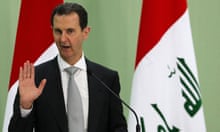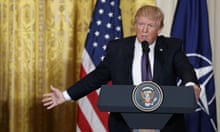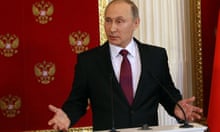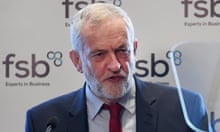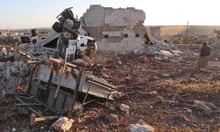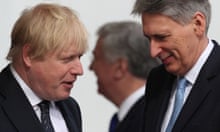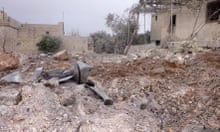The Trump administration has signalled much broader grounds for future military intervention in Syria, suggesting it might retaliate against the Assad regime for barrel bomb attacks.
On the eve of a critical visit to Moscow at a time of high US-Russian tensions over Syria, the US secretary of state, Rex Tillerson, appeared to go even further, saying his country would come to the defence of innocent civilians “anywhere in the world”.
The administration had initially stressed strictly limited objectives for a cruise missile strike last week on a Syrian air force base, saying it was intended to deter the repeat of a chemical attack on Tuesday against civilians and that the focus of US efforts in Syria remains combating the Islamic State (Isis).
On Monday, however, the White House spokesman, Sean Spicer, widened the criteria for retaliation. “When you watch babies and children being gassed, and suffer under barrel bombs, you are instantaneously moved to action,” he said. “I think this president’s made it very clear that if those actions were to continue, further action will definitely be considered by the United States.”
On Tuesday diplomats gathered in Italy for a second day of G7 talks dominated by the war in Syria, as officials in Washington, the UK and elsewhere floated the possibility of new sanctions on the Syrian and Russian military.
US intelligence believes Assad carried out last week’s attack with the chemical agent sarin, killing dozens of civilians including children. But Spicer made the first mention of the use of barrel bombs – crude munitions that can cause indiscriminate casualties.
Pressed on whether chemical warfare as opposed to conventional warfare constitutes a red line, he replied: “I think the president’s been very clear that there were a number of lines crossed last week ... The answer is if you gas a baby, if you put a barrel bomb into innocent people, I think you will see a response from this president. That is unacceptable.”
The White House said later that Spicer was referring to barrel bombs carrying industrial chemicals like chlorine. But that would still represent a substantial expansion of the US rules of engagement in Syria. The regime is suspected of using chlorine gas in its attacks on dozens of occasions since 2013.
Tillerson made his remarks during a visit to the site of a 1944 Nazi massacre in Italy, but they clearly referred to the Trump administration’s decision on Thursday to launch missile strikes against a Syrian airbase from which the US said a regime chemical attack had been launched against civilians in a rebel-held town.
Tillerson is in Italy for a G7 foreign ministers’ meeting dominated by discussion of western policy towards Damascus and Moscow. The UK foreign secretary, Boris Johnson, who cancelled his own planned visit to Moscow on Monday, said the ministers would be “discussing the possibility of further sanctions certainly on some of the Syrian military figures and indeed on some of the Russian military figures who have been involved in coordinating the Syrian military effort”.
The ministers met again early on Tuesday Morning before Tillerson flies on to Moscow. According to one G7 source, Tillerson plans to offer the Putin regime a bald choice, between cutting Bashar al-Assad loose and being rewarded with a thaw in relations with the west; or continuing to back him, and risking a Libyan-style outcome. The Libyan leader, Muammar Gaddafi, was violently deposed and killed in 2011 by rebels lent air support by Nato powers, including the UK.
Whitehall sources say Britain has been instrumental in helping to persuade the US to support the idea that Assad – and his family – must be removed from power before progress can be made. Johnson is pushing for the strongest possible conclusion, including the threat of targeted sanctions against Syrian and Russian military commanders – a proposal he judges more likely to win support than wider economic penalties against Moscow.
The decision to approve the missile strike on the Shayrat Syrian air force base marked a sharp change in direction for Donald Trump, who had furiously opposed any such intervention by the Obama administration, and had pledged an “America first” foreign policy that would focus on counter-terrorism and narrowly defined US national interests.
Trump emphasised the child victims of the poison gas in justifying the launch of 59 Tomahawk cruise missiles aimed at infrastructure at the Shayrat base, Spicer’s comments suggested the president’s concern for Syrian children extended to victims of conventional bombing too. Over half a million people have been killed in the six years of the Syrian war. Tillerson’s comments suggested that the administration was even open to humanitarian intervention elsewhere.
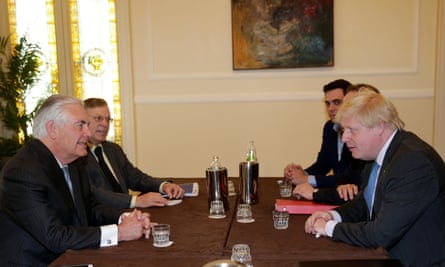
Speaking to journalists at the site of the 1944 massacre in the Tuscan village of Sant’Anna, the secretary of state said: “We rededicate ourselves to holding to account any and all who commit crimes against the innocents anywhere in the world.”
The remarks appeared to conflict with Tillerson’s own comments on Sunday in which he claimed the administration’s priority in Syria had not changed; it remained the defeat of Isis, and only after that could Syria’s political stability be considered. On the same today, the US envoy to the UN, Nikki Haley, said “getting Assad out” was one of “multiple priorities” held by the administration.
Mike Dubke, Trump’s communications director, conceded at a meeting of White House staffers last Tuesday before the missile strike that the president lacked a coherent foreign policy and said that “there is no Trump doctrine”, according to an account of the meeting by Politico.
“It’s head-spinning,” said Philip Gordon, a special assistant to the president on the Middle East in the Obama administration. “They went from vehement opposition to any kind of military intervention to executing those strikes and saying that’s what we would be doing any time chemical weapons are used.
“This is on a whole new level, if Tillerson is really saying we would defend the innocent anywhere in the world,” Gordon added. “If that’s the new standard, we are going to be doing a lot of intervening.”
Russia has denied the Syrian regime carried out the Khan Sheikhun chemical attack, which killed more than 80 people (including in strikes on hospitals after the attacks), and has denounced the US missile strike as illegal. Tillerson is due to meet his Russian counterpart, Sergei Lavrov, in Moscow. A Kremlin spokesman said there were no plans in Putin’s diary “right now” for a meeting, but US officials are expecting Putin to meet Tillerson on Wednesday. The two men had cordial relations when the Texan was in his previous job as head of the ExxonMobil oil company.
Another issue that hangs over Tillerson’s trip to Moscow is the question of Russia’s complicity in the chemical attack. Russian troops are stationed at their own compound at the Sharyat base and were there at the time Washington alleges Syrian aircraft took off on Tuesday for the attack on Khan Sheikhun.
The Associated Press quoted a senior US official as saying the US had concluded that Russia had prior knowledge of the Tuesday chemical attack on Khan Sheikhun. The official said a drone operated by Russians was flying over a hospital as victims of the attack were rushing to get treatment. Hours after the drone left, a Russian-made fighter jet bombed the hospital in what American officials believe was an attempt to cover up the usage of chemical weapons, the AP reported.
Charles Lister, a Syria expert at the Middle East Institute, said: “I’m told the US knows of Russia’s involvement in the CW [chemical weapons] attack and hopes to use this as back-scenes leverage.”
But on Monday evening, at a snap off-the-record briefing at the White House, a senior administration official rejected the claim, insisting that no such consensus about Russia’s foreknowledge exists in the intelligence community.
A joint command centre made up of the forces of Russia, Iran and militias supporting the Syrian regime warned the US missile strike had crossed “red lines” and it would respond to any new aggression and increase its support for its ally.
“What America waged in an aggression on Syria is a crossing of red lines. From now on we will respond with force to any aggressor or any breach of red lines from whoever it is, and America knows our ability to respond well,” the centre said in a statement published by the group on the media outlet Ilam al Harbi (War Media).
The supreme leader of Iran, which provides substantial ground support to the Assad regime, has also warned the US that its intervention would prove to be a mistake for Trump.
What is the G7?
The Group of 7, known as the G7, is a forum of countries representing about half the world's economic output. It currently consists of the UK, the US, Canada, France, Germany, Italy and Japan. The EU is also represented. Leaders from the group meet regularly to discuss the global economy, international security and the environment. In 2014, Russia was expelled from the group, then called the G8, over the Kremlin's annexation of Crimea. The G7 meeting in Italy provided an opportunity to discuss options for putting pressure on Assad and his main foreign backer, Russia. By coordinating efforts, the G7 hoped for a greater chance of success in shifting Moscow's strategic calculus on Syria.
“This is their last in a series of strategic errors ... which will definitely have backlash against their own interests,” Ayatollah Ali Khamenei told senior commanders of the Iranian armed forces on Sunday.
The most immediate issue on the agenda of Tillerson’s talks with Lavrov will be the future of a hotline between the US and Russian militaries, intended to avoid collisions between their warplanes over Syria. Moscow announced it had been suspended in reaction to the US Tomahawk strike. But on Monday, three days after the strike, Pentagon officials would not say if Russia had actually used the channel to guard against any accidental midair confrontation, and declined all comment on the subject.
Statistics released by the US military show airstrikes in Syria reducing slightly in volume on Friday, the day after the strike, to seven strikes, the lowest coalition total in Syria in April. But the strike tempo picked up over the weekend, to a typical recent volume of 16 strikes on Saturday and 18 on Sunday against Isis targets in eastern Syria.
Additional reporting by Saeed Kamali Dehghan

